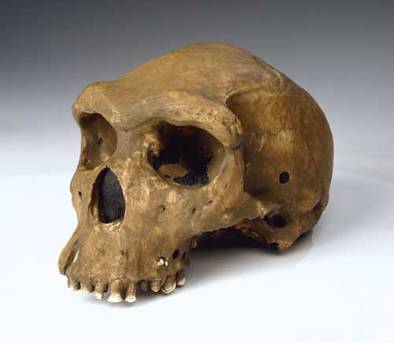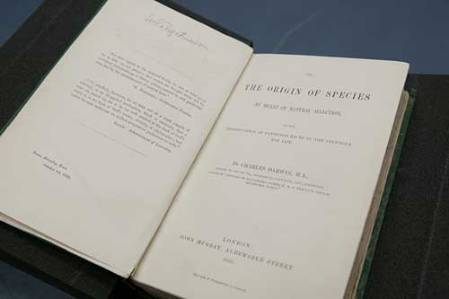Can humans go extinct? This was the question that we asked the audience at the last evening discussion event on 25 January. Louise Humphrey, a palaeontologist here at the Natural History Museum, started the debate by pointing out that human extinction has already happened. Homo sapiens may have been around for 200,000 years but all other species in the genus Homo are now extinct.
Skull of an Homo heidelbergensis, an extinct human species.
Anders Sandberg from the Future of Humanity Institute told us that there are more scientific papers about dung beetle sex than human extinction. He suggested that our brains are not well equipped to think about our own extinction, “One life lost is a tragedy, one million lives lost is a statistic, seven million is impossible to comprehend”. Perhaps we are underestimating the risk of our own extinction and should be doing more research into how we could prevent it, after all the dodo didn’t see it coming.
 Could humanity go the way of the dodo?
Could humanity go the way of the dodo?
“What is special about us as a species?” asked Mark Thomas, Professor of Evolutionary Genetics at UCL. He argues that it is our reliance on cumulative culture that defines us, not our large brains or creativity. Maintaining certain skills is dependent upon a threshold population size and it is only when skills are maintained that they can be enhanced. If the human population were to decline below this threshold, we would lose those skills. This prompted questions about data storage with reference to the recent news that researchers have successfully stored information in DNA. Anders commented that storing data is only worthwhile if someone can access it. If the human population fell significantly and some technology was lost then future generations are more likely to be able to access books than computers.
Are books the best way to store information for future generations?
The discussion moved from human extinction to the future of humanity, could technological advancements save us or contribute to our extinction? Anders warned that technology gives more power to less people and it is becoming easier for a small group of people to cause huge damage to the human species, and our planet. Mark pointed out that if the human population suddenly declined then we would be left with small communities of people who know how to use technology and not how to survive.
The evening concluded with thoughts about where the human species might be in the future. Would we be extinct and, if we were to survive, what might future humans look like? The speakers agreed that if we do survive, we will have evolved significantly. At some point in the future the human species will have changed enough for our descendants to look back and see us as a different species.
This discussion was part of a series of events that we will be running alongside the new exhibition Extinction: Not the end of the world? Next month we will be Bringing Back the Dead, join an expert panel to discuss the benefits, risk and ethics of bringing back extinct species such as the mammoth and the Neandertal. Join the debate on 22 February.




